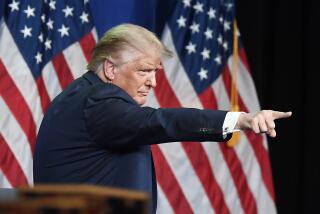Marxists Seeking a Great Leap Backward : Conservatives: Only a revival of orthodox communism can save the economy, hard-liners say.
- Share via
MOSCOW — After five years of cataclysmic change in the Soviet Union, which has exposed Josef Stalin’s crimes, freed political prisoners, opened up the media and set the superpowers to serious work on disarmament, it is difficult to fathom a return to old-style communism.
The architects of the Communist Party’s Marxist Platform are advocating not just a rollback to 1985, when President Mikhail S. Gorbachev launched his perestroika campaign, but to the early 1970s, when they believe the current economic crisis gripping the nation first took root.
Orthodox adherents to the ideology that was given life in the Soviet Union 73 years ago say there is no risk of repealing the democratic advances that have loosened the grip of repression at home and suppression abroad.
But to wrest the nation from economic chaos that has accompanied the political gains, the Marxists contend that a great leap backward is the only hope for recovery.
Putting the brakes on perestroika is the cornerstone of the Marxist Platform, a proposed statement on party policy drafted by the Communist Party’s arch-conservative cadres.
The party traditionalists have advanced their “anti-crisis program” to counter a plan for radical transition to market economics offered by the rival and equally narrow left wing.
While both programs are heavy on polemics and light on procedure, they have erected the rallying posts for the polarized delegates to the 28th Communist Party Congress, which opened here Monday.
The bedrock of the Marxist Platform is its bold contention that the objectives of the 1917 Bolshevik Revolution were the will of the people and should be retained as the guiding force in Soviet society.
That includes “democratic control of the market,” with fixed prices and guaranteed jobs, and the premise that “private property has no future,” according to the draft aired at meetings in the Moscow suburb of Bykovo in mid-June.
The “Leningrad Initiative,” as the most conservative proposal is known, trains its guns on widespread corruption, which the orthodox Communists see as a demoralizing blow to working people.
No specific measures have been outlined on how the party would combat unearned income and the “shadow economy,” which has made reformers fearful that the Marxists seek to reinvigorate KGB secret police activity and curb personal freedoms brought about by perestroika.
“There are 140,000 millionaires in our country--a nation founded on the concept of equality,” said Richard I. Kosolapov, a Marxist philosophy professor at Moscow State University, an orthodox Communist with a love of statistics and scientific formulas. “What we need is a monetary reform that will wipe out this unearned wealth.”
Kosolapov, one of the authors of the traditionalists’ blueprint, has been pushing for replacement of the Soviet currency, with a one-to-one exchange but only up to 10,000 rubles. The proposal is considered by pro-market forces to be a dangerous discouragement of personal incentive, already woefully lacking in their society.
“Poverty has already become our commonplace, yet when someone opposes further hazards for the working people, he is labeled a conservative,” Kosolapov stated. “If we move to a market economy, we will have unemployment on the scale of the Great Depression.”
One of the biggest mysteries at the congress is to what degree its final policy statement will incorporate elements of each extreme.
The founding congress of the Russian Communist Party in late June served as a hard slap in the face of reformers, who had previously underestimated the strength of the conservative forces in the party. Gorbachev was harshly criticized and accused of dismantling the inner workings of Marxism to the detriment of the average wage-earner.
Party centrists and reformers fear the national congress could provide the right-wing forces another chance to consolidate strength and thwart the movement for democratic change.
No one wants to talk about moving backward in social development, but that is precisely what needs to be done, said Ivan I. Antonovich, a social scientist on the staff of the party’s policy-making Central Committee.
“Are we really that idiotic that we think we can jump in five years to the kind of markets that took the West centuries to develop?” he asked.
More to Read
Sign up for Essential California
The most important California stories and recommendations in your inbox every morning.
You may occasionally receive promotional content from the Los Angeles Times.











